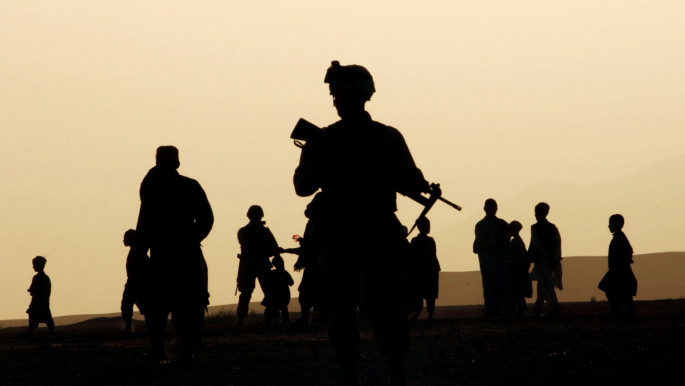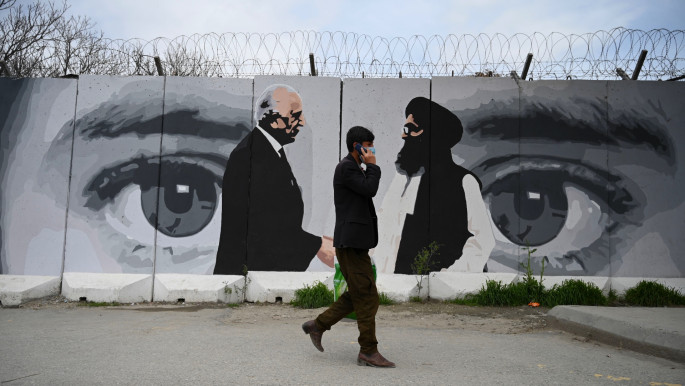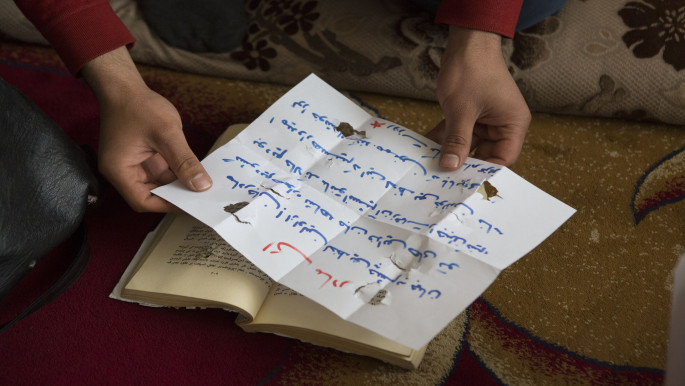As America's 'forever war' ends, Afghanistan's battle is set to continue
Twenty years later, this highly symbolic date will once again be a day of commiseration for some and a day of celebration for others. Although the Taliban officially condemned the 9/11 attacks in 2001, the acts of deadly terrorism were praised by many in parts of the country under Taliban rule.
This time around, the Taliban will celebrate 9/11 as a day of victory over the US and its NATO allies. In Kabul and within the Afghan government, many see it as an "irresponsible" withdrawal.
After much deliberation, Biden announced that in line with the former Trump administration's agreement with the Taliban, the withdrawal of US troops would commence on 1 May 2021, and be completed by 11 September.
With the Afghan government likely to find it difficult to control outcomes on the battlefield, the Taliban is already sensing victory.
"I am now the fourth American president to preside over an American troop presence in Afghanistan. I will not pass this responsibility to a fifth," US President Joe Biden said. Soon after the announcement, Biden spoke with Afghan President Ashraf Ghani "to affirm US support for continued development, humanitarian, and security assistance in Afghanistan and a political settlement that lets the Afghan people live in peace".
 |
While the Taliban will celebrate the withdrawal as a day of victory over the US and its NATO allies, many within the Afghan government see it as 'irresponsible' |  |
Last month, to get peace talks back on track, the Biden administration shared a draft agreement with both the Taliban and the Afghan government. The draft 'Afghanistan Peace Agreement' is the second key document related to the Biden administration's efforts to push forward Afghanistan's peace process, following US Secretary Antony Blinken's letter to the Afghan president urging him to participate in the upcoming conference on Afghanistan in Turkey - the fate of which now hangs in the balance.
After the Taliban announced their unpreparedness for the 16 April Istanbul Conference, 24 April was set as a new date. "Until all foreign forces completely withdraw from our homeland, the Islamic Emirate will not participate in any conference that shall make decisions about Afghanistan," tweeted Dr. Naeem Wardak, spokesman of the Political Office of the Taliban in Doha, in response to the new withdrawal timeline set by the Biden administration.
 |
|
| Read more: Can Biden end America's forever wars? |
Istanbul conference
In an unannounced visit to Kabul less than 24 hours after the new withdrawal timeline, the US Secretary of State Anthony Blinken reassured Afghan government leaders that the drawdown does not mean the end of the US relationship. Blinken told the media in Kabul that "they are fully prepared for the Istanbul conference on Afghan peace and hope that all Afghan parties and the international community will participate."
As a historical ally and the seventh-largest contributor to the NATO mission, Turkey has played a significant role in Afghanistan. Given Turkey's good relationship with Afghanistan and its neighbour Pakistan, it has given a glimmer of hope to the people of Afghanistan that a peaceful solution could be found. However, if the Taliban do not attend the Istanbul conference than the future equation is likely one of ongoing war - a conflict that may be ending for the US but not for the people of Afghanistan.
"The co-sponsors of the conference, Turkey, Qatar, and the UN, will try to convince the Taliban to attend - and the US will likely pressure Pakistan to apply pressure as well," Andrew Watkins, International Crisis Group's (ICG) Senior Analyst for Afghanistan, told The New Arab.
 |
So far, the Taliban appear poised to return to unrestricted warfare. The real unknown factor is how much support the US will be willing and able to provide Afghan forces while they also focus on their withdrawal |  |
Just how successful the Istanbul conference could be, however, is still uncertain. "Turkey's role of host is one of a friendly country to all countries in the region, which can help the process. Turkey can be a good host to all participants. The outcome will depend a lot on Afghan leaders, the Taliban included," Torek Farhadi, a former adviser to Afghanistan's president, told The New Arab.
Some observers believe that by refusing to participate in the Istanbul conference the Taliban is adding pressure to its demand to free another 7,000 of their fighters from government jails. Having failed to fully explain why they object to the conference, statements by Taliban figures seem to suggest that they believe that "the conference was an attempt to circumvent the Doha agreement and impose further commitments on the group," adds Andrew Watkins.
 |
|
| Read more: As clock ticks, Biden's peace plan risks alienating Afghanistan's rival powers |
The fighting season
Following Biden's announcement, the Taliban, in an official statement, accused the US of breaching the Doha agreement, which "in principle opens the way for the Mujahideen of Islamic Emirate to take every necessary countermeasure, hence the American side will be held responsible for all future consequences." The statement "urges America and all occupying countries to stop making excuses for prolonging the war and to withdraw all their forces from Afghanistan immediately."
Earlier this month, a video of a cadre of young men in a Taliban military training camp, the location of which is unknown, was circulated by Taliban-affiliated social media accounts. A young man delivering a speech in English with his face covered asks the Americans to abide by the Doha agreement and "leave the country as soon as possible." The video, which appears to be aimed at the US and international allies, declares that the Taliban military and martyrdom-seeking fighters "are awaiting the order of the Emir and the establishment of the Islamic system [...] all around the world."
 |
With the Afghan government likely to find it difficult to control outcomes on the battlefield, the Taliban is already sensing victory |  |
While the Taliban is demonstrating its battlefield readiness, the US has made its intentions clear that the group "recognize that it will never be legitimate and it will never be durable if it rejects a political process and tries to take the country by force," Blinken said, warning the Taliban against attempting to take over Kabul.
The Taliban claim they are abiding by the Doha agreement, pointing out that they have not killed any US or international troops for over a year. However, in the first three months of this year, civilian casualties in Afghanistan rose by 29 percent compared to the same period in 2020. While the US and its allies find themselves well protected by the Doha deal, the Afghan people have not experienced a reduction in violence, with the government dragged into fighting on multiple fronts.
 |
|
| Read more: Assassination campaign targets intellectuals in Afghanistan |
After two decades of attempting to promote and nurture democracy in Afghanistan, the future for the government looks bleak. Even the US and its international allies doubt whether it will survive the Taliban's onslaught. "Even with the continuation of financial assistance from the United States to your forces after an American military withdrawal, I am concerned that the security situation will worsen and that the Taliban could make rapid territorial gains," Secretary of State Anthony Blinken wrote to the Afghan president last month.
It is unclear how the new date for the US troop withdrawal will affect the possibility of violence in the coming months. The Taliban has yet to announce its spring military offensive, which has come to mark the beginning of a so-called 'fighting season'.
"So far, the Taliban appear poised to return to unrestricted warfare. The real unknown factor is how much support the US will be willing and able to provide Afghan forces while they also focus on their withdrawal," ICG's Andrew Watkins told The New Arab. The Taliban has reportedly already taken up offensive positions in some provinces.
"We have repeatedly warned senior security officials that Ghazni province is under serious threat," Arif Rahmani, a member of the Internal Security Committee in the Lower House of Parliament, tweeted just hours before the US withdrawal announcement. "Unfortunately, these warnings went unheeded. It is now being reported that Qarabagh district is under siege by the Taliban and will fall if support does not reach as soon as possible".
Sayed Jalal Shajjan is a freelance journalist based in Kabul. He covers post-conflict development and counter-terrorism operations
Follow him on Twitter: @jsaeedsh





 Follow the Middle East's top stories in English at The New Arab on Google News
Follow the Middle East's top stories in English at The New Arab on Google News


